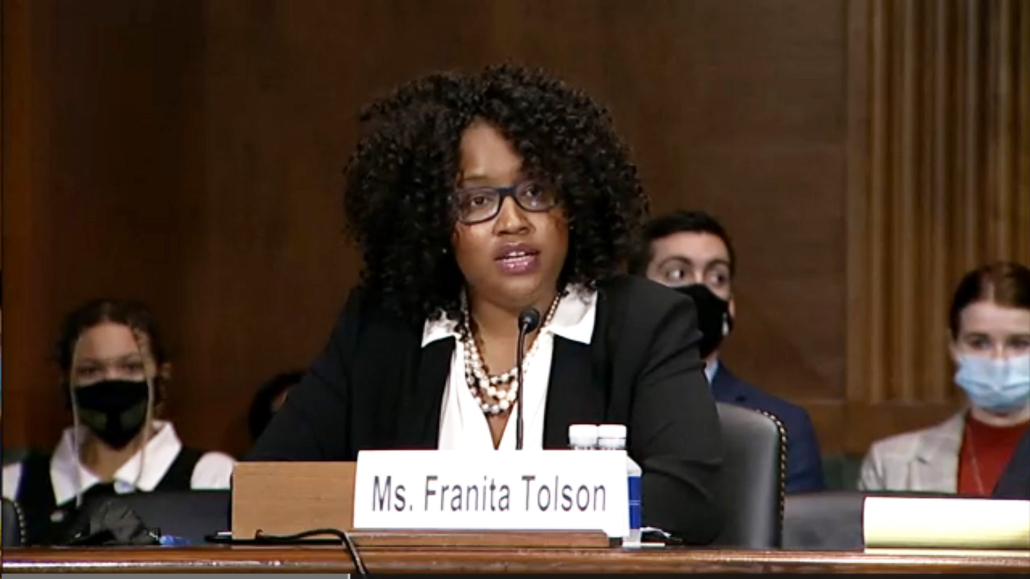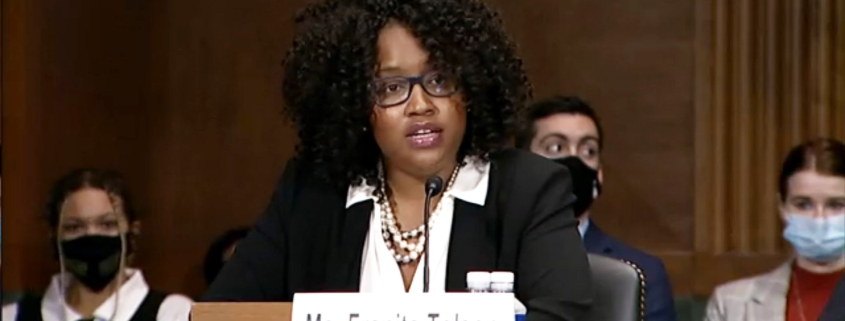Gould’s Franita Tolson on the Senate floor

On the Senate floor Sept. 22, Franita Tolson, along with four other witnesses, sat in front of a subcommittee which included Texas Sen. Ted Cruz entitled “Restoring the Voting Rights Act: Combating Discriminatory Abuses.” When Cruz asked for Tolson’s opinion about voter ID restriction laws throughout the country, Tolson replied confidently.
“What voter ID laws are racist?” Cruz asked Tolson.
“Apologies, Mr. Cruz. Your state of Texas, perhaps,” Tolson responded.
Testifying in front of prominent political figures is not new for Tolson, the Vice Dean of the Gould School of Law. In July, she testified twice before the House of Representatives about election laws, becoming a favored resource for the House and Senate.
In her experience with the House of Representatives, Republican senators do not address witnesses very often, Tolson said in an interview with the Daily Trojan. When Cruz first addressed her, Tolson was eager to see a Republican senator was engaging in the discussion.
“I actually thought it was a good thing because it shows a broader engagement with these issues and possibly a willingness to listen to a witness regardless of their view,” Tolson said.
However, Tolson said the initial happiness wore off, turning into intense focus as Cruz started asking about specific voting ID laws.
“No matter what his aim is, I’m here for one purpose only,” Tolson said. “That is to educate Congress on the need for new federal legislation.”
After closely following the 2008 election, Tolson saw a career path as a lawyer with an expertise in voting rights. Originally from Chicago, Tolson attended Truman State University, majoring in history. She then attended law school at the University of Chicago to combine her passion for history with something “intellectually challenging” that would help increase voting access across the country.
“[The 2008 election] was probably the most exciting election in my lifetime,” she said. “But it also felt like there was a lot of work that needed to be done to make sure that communities of color could participate on the same level and in the same ways as voters in the majority.”
Tolson’s challenge to Cruz made national headlines. Andrew Guzman, Dean of Gould, was proud of the attention Tolson’s interaction with Cruz received, noting the importance for faculty to “speak their views loudly.”
“You don’t need to take a political position to believe that the rules around voting are important,” Guzman said. “We know this is true when you watch the fights that are going on over voting in our country right now, everybody knows they’re important, whatever views you have.”
Rebecca Brown, Trustees Chair at Gould, heard about Tolson’s work when Tolson first started in academia. Impressed by her earlier works, Brown played a role in convincing Tolson to come to USC as a professor.
“I’ve always been proud to brag about the fact that I was the one who spotted the talent because she has really impressed us so much since I got her here to join us,” Brown said.
Tolson has been Vice Dean of Gould since July 2019, navigating the campus shutdown from the pandemic and the increased focus on racial justice issues due to nationwide protests.
“She has not had an easy time to be in a position of leadership in her Vice Dean position,” Brown said. “And she has just handled it beautifully with wisdom and with grace, always with a smile and a good sense of humor.”
Tolson is currently working on a book titled “In Congress We Trust?” The book will highlight provisions of the constitution Congress can use to expand voting rights besides the commonly cited 14th and 15th amendments. Tolson’s inspiration for the work came after testifying before the House in 2019 about the Voting Rights Advancement Act, which aimed to establish a specific process for reviewing voting legislation changes throughout the country in order to decrease voter discrimination.
“One of the things I realized in the course of that testimony is that a lot of times, members of Congress are just not aware of everything that they can do,” Tolson said. “They deal with a million different issues, all very different, so I realized they might not actually understand the full extent of their power over this issue.”
After her interaction with Cruz, Tolson hopes to maintain her voice in the election law space and to continue speaking with people who have political influence both at the national and state levels.
“[I want to keep] talking to members of Congress and talking to elected officials about the importance of protecting the voting rights of minority communities, but also how this bleeds over into protecting everyone’s voting rights,” Tolson said. “Because when you care about the most vulnerable members of society that benefits everyone, it’s not just about that group.”

